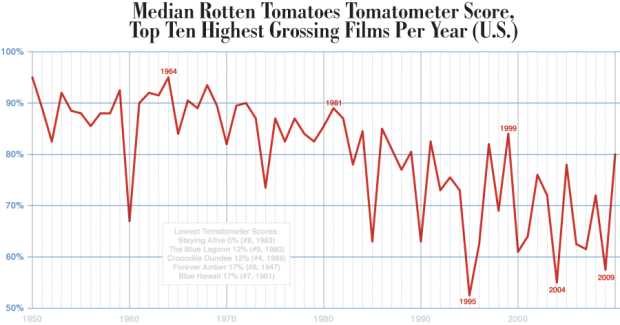Dorothy Gambrell of very small array charts median Tomatometer ratings of the top 10 grossing films, since 1950. From the graph it looks like movies are getting worse, but are they really? This goes back to a similar argument from a couple of months ago. The decline is probably more of an indicator of reviewers, viewers, movie types, and ease of watching than it is of a drop in quality.
Dropping movie ratings from the past six decades



The chart seems to be an example of survivorship bias. The movies from the 50s reviewed on the site is a fraction of all movies released that year. The forgotten releases are, on average, worse than the remembered ones.
Think of it this way – 60 years from now, will anyone want a copy of “Legion”?
But it only takes the top grossing movies, so most movies from each year are being ignored.
I originally conjectured that there were many fewer movies in the ’50’s and ’60’s (and therefore the average quality was higher), but that does not seem to be the case. I went to ask.com and counted the pictures released in 1950 (http://wiki.ask.com/1950_in_film#Films_released_in_1950) and in 2010 (http://wiki.ask.com/2010_in_film?qsrc=3044 ). In 1950, there were 111 US movies released, which is more than I would have guessed. In 2010, there were 127 movies in “wide release” (and more than twice that many had limited releases).
My personal theory is that it is so easy to make movies with awesome special effects that storylines are a secondary consideration. Critics respond to story lines (=tomatometer scores) whereas audiences flock to special effects (=high grossing movies).
Perhaps there is survivorship bias not only among movies, but also among reviewers. If viewers are less critical of the movies they saw first when they were younger, than you would get such a trend. Older reviewers remember the movies fondly that they saw when they were younger, whereas people who were as old in the 1950s as the median reviewer is today are no longer alive, and therefore their less enthusiastic reviews don’t count here. In other words, 1950-1970 movies are mainly reviewed here by people who saw them first when they were very young, whereas contemporary movies are reviewed by people who saw them first at all ages.
the more movies you watch the easier it becames to get bored by the new ones imho.
You know, it’s not actually possible to quantify the quality of a movie (or a book, an album, a video game, etc.). Don’t let them fool you.
The problem is what jimlynch9999 stated. Rotten Tomatoes compiles ONLINE reviews. How many people are going to go back and post their review of all the movies they hated back in the 60s, 70s? They’ll post their review of the classics, but won’t bother with the crap.
Also…On Rotten Tomatoes, Casablanca has ~50 reviews, Godfather has ~70. Gone with the Wind has ~60. I find it hard to believe that under 100 reviewers saw these movies. In comparison, Harry Potter has over 200.
I would use the highest rated films of the year excluding the artsy, underground ones. Maybe you could take a weighted average of highest 10 ratings, weighted to dollars generated. The 1995 year, for example, includes ratings from Batman Forever and Ace Ventura: When Nature Calls. Of course those two movies will pull down the median rating.
Simply, there is a larger market, and more crap dragging the average down. It’s not a surprise, to be honest… it’s just what happens what a market starts to saturate. When the car market was tiny, and the ford model T owned all… for a many-year period the average ratings of “the entire market” (aka just the ford model T) would probably be extremely high!
But now, if you did an average rating scale, including all the crap and cloning going on, you would see the average drop off since the “good old days”. :)
When I first saw this entry on my RSS feed, I thought it would be about falling MPAA ratings over the past 60 years (e.g. G, PG, R). I think that would be an interesting trend to graph, since I’ve noticed that movies produced earlier tend to have much more severe ratings for the same kinds of content that would receive a lower rating today. This is also interesting, though.